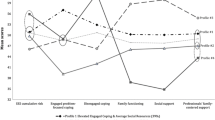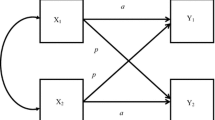Abstract
This study used structural equation modeling to examine the relationship between multiple sources of social support (e.g., partner, family, and friends), optimism, and well-being among mothers of children with ASD. Social support was examined as a mediator and moderator of the optimism-maternal well-being relationship. Moreover, the role of optimism as a mediator of the social support-maternal well-being relationship was also evaluated. Results revealed that family support was associated with increased optimism that, in turn, predicted higher levels of positive maternal outcomes and lower levels of negative maternal outcomes. In addition, partner and friend support were directly associated with maternal outcomes. Implications for the development of interventions directed at increasing the quality of social support networks are discussed.



Similar content being viewed by others
References
Achat, H., Kawachi, I., Spiro, A., DeMolles, D. A., & Sparrow, D. (2000). Optimism and depression as predictors of physical and mental health functioning: The normative aging study. Annals of Behavioral Medicine, 22, 127–130.
Aiken, L., & West, S. (1991). Multiple regression: Testing and interpreting interactions. Newbury Park, CA: Sage.
Baron, R. M., & Kenny, D. A. (1986). The moderator-mediator variable distinction in social psychological research: Conceptual, strategic, and statistical considerations. Journal of Personality and Social Psychology, 51, 1173–1182.
Benson, P. R. (2006). The impact of child symptom severity on depressed mood among parents of children with ASD: The mediating role of stress proliferation. Journal of Autism and Developmental Disorders, 36, 685–695.
Bishop, S. L., Richler, J., Cain, A. C., & Lord, C. (2007). Predictors of perceived negative impact in mothers of children with autism spectrum disorder. American Journal on Mental Retardation, 112, 450–461.
Bonds, D. D., Gondoli, D. M., Sturge-Apple, M. L., & Salem, L. N. (2002). Parenting stress as a mediator of the relation between parenting support and optimal parenting. Parenting Science and Practice, 2, 409–435.
Boyd, B. A. (2002). Examining the relationship between stress and lack of social support in mothers of children with autism. Focus on Autism and Other Developmental Disabilities, 17, 208–215.
Brissette, I., Scheier, M. F., & Carver, C. S. (2002). The role of optimism in social network development, coping, and psychological adjustment during a life transition. Journal of Personality and Social Psychology, 82, 102–111.
Bristol, M. M. (1984). Family resources and successful adaptation to autistic children. In E. Schopler & G. B. Mesibov (Eds.), The effects of autism on the family (pp. 290–308). New York: Plenum Press.
Bromley, J., Hare, D. J., Davison, K., & Emerson, E. (2004). Mothers supporting children with autism spectrum disorders—Social support, mental health status and satisfaction with services. Autism, 8, 409–423.
Cervone, D. (2004). The architecture of personality. Psychological Review, 111, 183–204.
Cohen, S., & Wills, T. A. (1985). Stress, social support, and the buffering hypothesis. Psychological Bulletin, 98, 310–357.
Conway, F., Magai, C., Springer, C., & Jones, S. C. (2008). Optimism and pessimism as predictors of physical and psychological health among grandmothers raising their grandchildren. Journal of Research in Personality, 42, 1352–1357.
Cox, M. J., & Paley, B. (1997). Families as systems. Annual Review of Psychology, 48, 243–267.
Coyne, J. C., Ellard, J. H., & Smith, D. A. F. (1990). Social support, interdependence, and the dilemmas of helping. In B. R. Sarason, I. G. Sarason, & G. R. Pierce (Eds.), Social support: An interactional view (pp. 129–149). New York: Wiley.
Devins, G. M., Orme, C. M., Costello, C. G., Binik, Y. M., Frizzell, B., Stam, H. J., et al. (1988). Measuring depressive symptoms in illness populations: Psychometric properties of the center for epidemiologic studies depression (CES-D) scale. Psychology and Health, 2, 139–156.
Dougall, A. L., Hyman, K. B., Hayward, M. C., McFeeley, S., & Baum, A. (2001). Optimism and traumatic stress: The importance of social support and coping. Journal of Applied Social Psychology, 31, 223–245.
Dunn, M. E., Burbine, T., Bowers, C. A., & Tantleff-Dunn, S. (2001). Moderators of stress in parents of children with autism. Community Mental Health Journal, 37, 39–52.
Ekas, N. V., Whitman, T. L., & Shivers, C. (2009). Religiosity, spirituality, and socioemotional functioning in mothers of children with autism spectrum disorder. Journal of Autism and Developmental Disorders, 39, 706–719.
Gill, M. J., & Harris, S. L. (1991). Hardiness and social support as predictors of psychological discomfort in mothers of children with autism. Journal of Autism and Developmental Disorders, 21, 407–416.
Greenberg, J. S., Seltzer, M. M., Krauss, M. W., Chou, R. J., & Hong, J. (2004). The effect of quality of the relationship between mothers and adult children with schizophrenia, autism, or down syndrome on maternal well-being: The mediating role of optimism. American Journal of Orthopsychiatry, 74, 14–25.
Hassall, R., Rose, J., & McDonald, J. (2005). Parenting stress in mothers of children with an intellectual disability: The effects of parental cognitions in relation to child characteristics and family support. Journal of Intellectual Disability Research, 49, 405–418.
Hu, L., & Bentler, P. M. (1999). Cutoff criteria for fit indexes in covariance structure analysis: Conventional criteria versus new alternatives. Structural Equation Modeling, 6, 1–55.
Julien, D., & Markman, H. J. (1991). Social support and social networks as determinants of individual and marital outcomes. Journal of Social and Personal Relationships, 8, 549–568.
Karademas, E. C. (2006). Self-efficacy, social support and well-being: The mediating role of optimism. Personality and Individual Differences, 40, 1281–1290.
MacKinnon, D. P. (2008). Introduction to statistical mediation analysis. New York, NY: Lawrence Erlbaum Associates.
MacKinnon, D. P., Lockwood, C. M., Hoffman, J. M., West, S. G., & Sheets, V. (2002). A comparison of methods to test mediation and other intervening variable effects. Psychological Methods, 7, 83–104.
MacKinnon, D. P., Lockwood, C. M., & Williams, J. (2004). Confidence limits for the indirect effect: Distribution of the product and resampling methods. Multivariate Behavioral Research, 39, 99–128.
Matthews, E. E., & Cook, P. F. (2009). Relationships among optimism, well-being, self-transcendence, coping, and social support in women during treatment for breast cancer. Psycho-Oncology, 18, 716–726.
Olsson, M. B., & Hwang, C. P. (2001). Depression in mothers and fathers of children with intellectual disability. Journal of Intellectual Disability Research, 45, 535–545.
Park, C. L., & Folkman, S. (1997). Meaning in the context of stress and coping. Review of General Psychology, 1, 115–144.
Pavot, W., & Diener, E. (1993). Review of the satisfaction with life scale. Psychological Assessment, 5, 164–172.
Pearlin, L. I., & Schooler, C. (1978). The structure of coping. Journal of Health and Social Behavior, 19, 2–21.
Pretzer, J. L., & Walsh, C. A. (2001). Optimism, pessimism, and psychotherapy: Implications for clinical practice. In E. C. Chang (Ed.), Optimism and pessimism, implications for theory, research, and practice (pp. 321–346). Washington, DC: American Psychological Association.
Radloff, L. S. (1977). The CES-D scale: A self report depression scale for research in the general population. Applied Psychological Measurement, 1, 385–401.
Rini, C., DuHamel, K., Ostroff, J., Boulad, F., Martini, R., Mee, L., et al. (2008). Social support from family and friends as a buffer of low spousal support among mothers of critically ill children: A multilevel modeling approach. Health Psychology, 27, 593–603.
Ryff, C. D., & Keyes, C. L. M. (1995). The structure of psychological well-being revisited. Journal of Personality and Social Psychology, 69, 719–727.
Scheier, M. F., & Carver, C. S. (1985). Optimism, coping, and health: Assessment and implications of generalized outcome expectancies. Health Psychology, 4, 219–247.
Scheier, M. F., & Carver, C. S. (1992). Effects of optimism on psychological and physical well-being: Theoretical overview and empirical update. Cognitive Therapy and Research, 16, 201–228.
Scheier, M. F., Matthews, K. A., Owens, J., Magovern, G. J., Lefebvre, R. C., Abbott, R. A., et al. (1989). Optimism and recovery from coronary artery bypass surgery: The beneficial effects on physical and psychological well-being. Journal of Personality and Social Psychology, 57, 1024–1040.
Schuster, T. L., Kessler, R. C., & Aseltine, R. H. (1990). Supportive interactions, negative interactions, and depressive mood. American Journal of Community Psychology, 18, 423–438.
Segerstrom, S. C., Taylor, S. E., Kemeny, M. E., & Fahey, J. L. (1998). Optimism is associated with mood, coping, and immune change in response to stress. Journal of Personality and Social Psychology, 74, 1646–1655.
Shelby, R. A., Crespin, T. R., Wells-Di Gregorio, S. M., Lamdan, R. M., Siegel, J. E., & Taylor, K. L. (2008). Optimism, social support, and adjustment in African American women with breast cancer. Journal of Behavioral Medicine, 31, 433–444.
Shrout, P. E., & Bolger, N. (2002). Mediation in experimental and nonexperimental studies: New procedures and recommendations. Psychological Methods, 7, 422–445.
Singer, G. H. S., Ethridge, B. L., & Aldana, S. I. (2007). Primary and secondary effects of parenting and stress management interventions for parents of children with developmental disabilities: A meta-analysis. Mental Retardation and Developmental Disabilities Research Reviews, 13, 357–369.
Singer, G. H. S., Marquis, J., Powers, L. K., Blanchard, L., Divenere, N., Santelli, B., et al. (1999). A multi-site evaluation of parent to parent programs for parents of children with disabilities. Journal of Early Intervention, 22, 217–229.
Trunzo, J. J., & Pinto, B. M. (2003). Social support as a mediator of optimism and distress in breast cancer survivors. Journal of Consulting and Clinical Psychology, 71, 805–811.
Watson, D., Clark, L. A., & Tellegen, A. (1988). Development and validation of brief measures of positive and negative affect: The PANAS scales. Journal of Personality and Social Psychology, 54, 1063–1070.
Weiss, S. (2002). Hardiness and social support as predictors of stress in mothers of typical children, children with autism, and children with mental retardation. Autism, 6, 115–130.
Whalen, H. R., & Lachman, M. E. (2000). Social support and strain from partner, family and friends: Costs and benefits for men and women in adulthood. Journal of Social and Personal Relationships, 17, 5–30.
Whitman, T. L. (2004). The development of autism: A self-regulatory perspective. London: Jessica Kingsley Publishers.
Zautra, A. J., Smith, B., Affleck, G., & Tennen, H. (2001). Examination of chronic pain and affect relationships: Applications of a dynamic model of affect. Journal of Counseling and Clinical Psychology, 69, 786–795.
Acknowledgments
This research was supported in part by an NIMH training grant (2 T32 HD007184-28) and by the Institute for Scholarship in the Liberal Arts at the University of Notre Dame. We thank the various parent support groups for their help and support in participant recruitment. We are also indebted to the families who gave their time to participate in this research. We are indebted to Cindy Bergeman and Anthony Ong for their help in the development of this project.
Author information
Authors and Affiliations
Corresponding author
Rights and permissions
About this article
Cite this article
Ekas, N.V., Lickenbrock, D.M. & Whitman, T.L. Optimism, Social Support, and Well-Being in Mothers of Children with Autism Spectrum Disorder. J Autism Dev Disord 40, 1274–1284 (2010). https://doi.org/10.1007/s10803-010-0986-y
Published:
Issue Date:
DOI: https://doi.org/10.1007/s10803-010-0986-y




